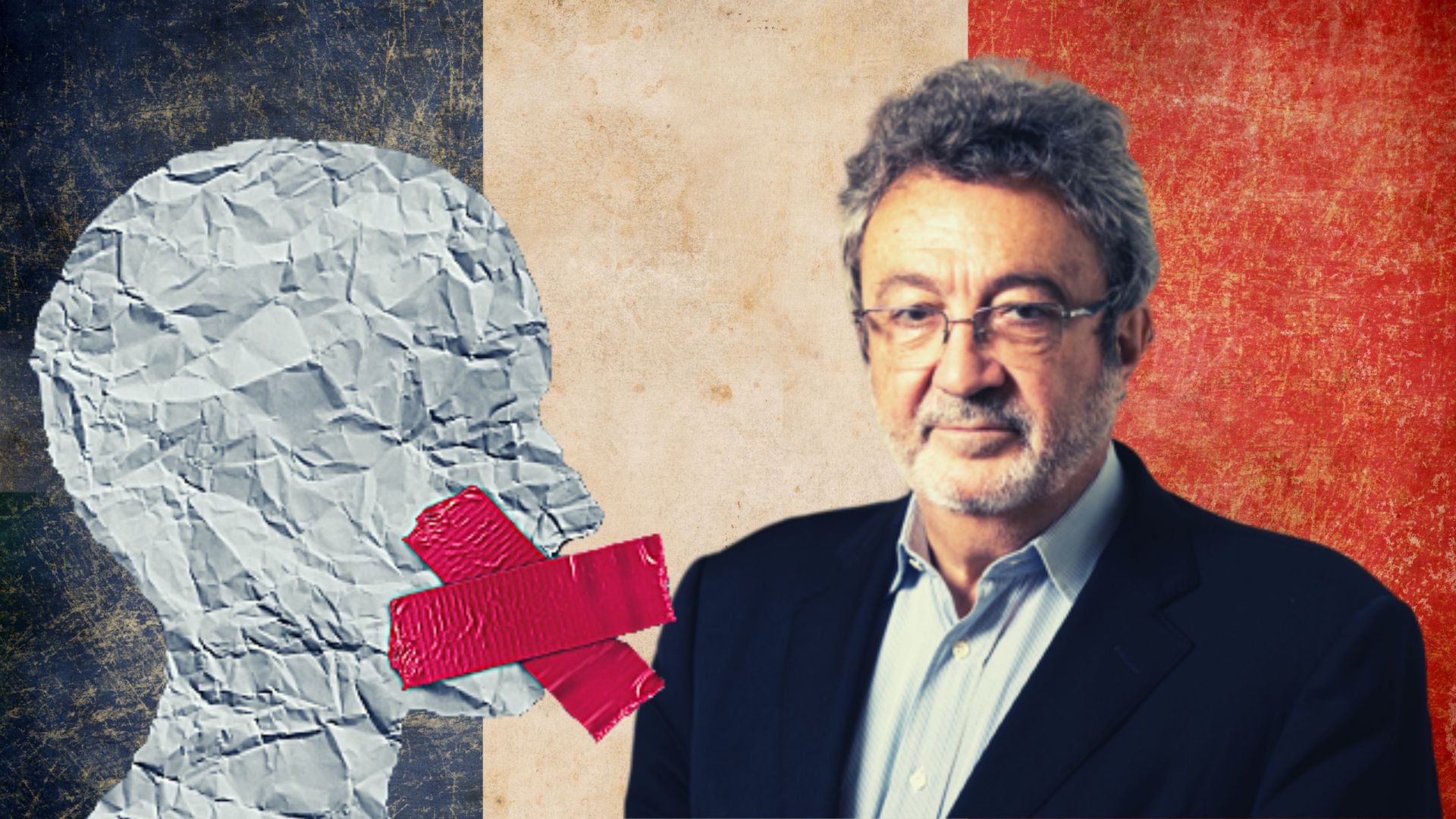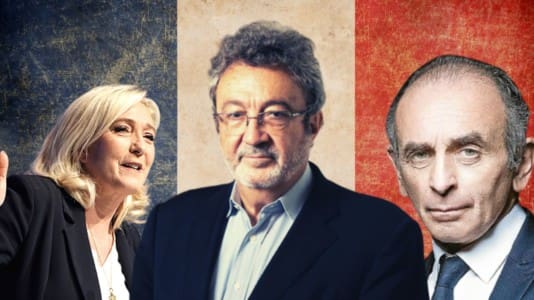This is part two of a two-part interview. In the previous interview with Claude Chollet, he discussed the threat of censorship to organizations in France, but also how conservative and other opposition organizations in the country could be banned under the pretext of hate speech. To read part one, click here.
You are the founder and managing editor of the Observatoire du Journalisme, a site that prides itself on informing those who inform the French, and does so with a rather conservative outlook, whereas France is dominated by progressive media. I hear you sometimes get into trouble for it.
Indeed, I created the Observatoire du Journalisme 11 years ago. It is a website that publishes critical analyses of journalism and the media and also produces factual portraits of journalists. To date, we have produced over 300 such portraits, and they are kept up to date. We have also produced 35 infographics on press groups, and with our daily articles we follow the economic life of the press, changes in the media, and also increasingly, alas, the censorship that affects the media and also social networks. We are of course interested in social networks, and now also artificial intelligence, which may well change a number of things in the media.
Obviously, not everyone likes what we do. I can imagine that this site might be rather unpopular with a majority of journalists in France, but our aim is not to be popular. The aim is to be truthful and honest. I do not claim objectivity because I do not believe in objectivity at all. I believe, however, in honesty and we try to be as close as possible to reality. So, of course, from time to time, we run into trouble.
For example, today we have a new trial in progress with a very young journalist named Amjad Allouchi, who works for the regional daily newspaper Le Progrès in Lyon. With the support of his newspaper, which is paying for his lawyers, Allouchi is attacking us in a ridiculous way for discrimination because we have questioned one of his articles in which he attacked a whistleblower who is very active in the Rhône-Alpes region and, in particular, in Saint-Étienne and Lyon.
[pp id=78891]
The whistleblower’s name is Isabelle Surplis, and she succeeded in getting a fundamentalist imam expelled from the town where she was a local councilor in the Rhône-Alpes region by broadcasting a video of one of his sermons. She was then attacked by this very young journalist from the Progrès in Lyon. We did an article highlighting the lack of honesty in this article penned by Allouchi, who was fresh out of journalism school and, I believe, not yet holding a press card at the time. And we simply wrote that Le Progrès had chosen journalist Amjad Allouchi for this story on Islamism, adding the words “no comment” in brackets after his name. It is regarding this “no comment” that we are being sued for discrimination. If the financial stakes weren’t so high, it would be laugh-out-loud funny. But the problem for us is that if we were to lose, it could cost us several tens of thousands of euros, which would be a very hard blow for a media site with resources as modest as ours.
I also have to say that we’ve unfortunately had to change our hosting provider and exile ourselves to the United States, which has been very painful for me. Our Ojim.fr site was hosted by OVH, France’s leading hosting company. But we were attacked by Radio France’s LGBT lobby called Le Cercle. This was because we did a rather ironic, but not insulting, article on Radio France’s LGBT lobby. This lobby did not attack us directly, but with the support of Radio France management, reported us to OVH, who suspended our site for an hour as a warning. I consulted my lawyer, who strongly advised me to change hosts, warning me that OVH doesn’t want any trouble and that the next time we are reported to them, they will suspend our website permanently, without warning and without any possibility of recourse.
The result is that it costs us three or four times as much to have our website hosted in the United States, where freedom of expression is greater, but we had no choice.
Today, the LGBT lobbies, and especially the trans lobby, which is the sub-section of the LGBT lobby that had attacked us, have real power to cause harm with their hysterical behavior.
There is a specific feature of French law that allows for subsidized associations, be they LGBT, pro-immigration, or other, to sue any individual or organization expressing opinions they consider to be an incitement to hatred or discrimination. This must be a major deterrent for conservative journalists and media since all these associations are made up of left-wing progressives.
Yes, indeed, it has been like that since the Pleven law of 1972, which was extended in 1990 with the Gayssot law, named after a Communist deputy. These two laws complement each other: The Pleven law allows associations, even if no individual has lodged a complaint, to bring a civil action for discrimination or incitement to discrimination on the grounds of race, religion or origin, while the Gayssot law allows them to do the same for anything to do with history, revisionism and so on. The scope covered by these state-subsidized associations has thus become extremely vast, while some of them, such as SOS Racisme, have virtually no members left (and now serves as a shell NGO to take money from the state). SOS Racisme is in fact a branch of the Socialist Party that lives only on subsidies and can lodge complaints against right-wing, anti-immigration, Catholic, conservative, or other media such as Fdesouche, the Salon Beige, ourselves, etc.
For journalists or media outlets under attack, it costs money and takes time to defend themselves. Even though I won my last case, I still had to pay lawyers’ fees. Each time, it’s 2,000, 3,000, or 5,000 euros in legal fees. So this is also a policy of attrition on their part.
Is that why there are so few conservative voices in the French media?
The reality is that there are some 37,000 press cards in France, and at least 5,000 journalists without press cards. In total, there must be 42,000 or 43,000 journalists, and the situation is not just black and white. I suppose we could say that a majority, maybe 50 or 60 percent, are more or less sincerely liberal leftists, i.e., more or less economically liberal and progressives on societal issues. Alongside this, there are perhaps 10 percent who are conservative. They keep quiet. The remaining 30 percent or 40 percent simply follow the mainstream.
As it happens, the editors of the Observatoire du Journalisme are often journalism students or young journalists who make a bit of money writing for us. One of my editors attended the Sciences Po School of Journalism. It is considered to be a good school and delivers a state diploma. This young journalist went on to work for the regional daily Ouest France. It is always interesting for a young journalist to work in the regional daily press because you learn your trade there. Only he left the paper after two and a half years. He explained to me that he couldn’t say anything there, he couldn’t express his views to anyone on the editorial team, and now he is even considering quitting journalism altogether. It wasn’t even the paper’s owner, the editor-in-chief, or this young journalist’s department head who was pressuring him, but his colleague closest to him at his desk who would come over and say: “Do you realize what you’re saying? Aren’t you with us? It’s very worrying, I’m asking you to correct your behavior,” etc., etc. He knew very well that if he kept expressing his viewpoint, he would be excluded from the editorial staff and then from the paper. At first, he expressed himself shyly, but then he understood how things work and kept quiet.
And it is the same in journalism schools, where students are actually trained to keep quiet. At the Observatoire du Journalisme, we are in the process of producing a series on journalism schools. We have already covered the Lille Graduate School of Journalism, which is the most leftist, and we have also covered the Sciences Po School of Journalism as well as Celsa.
To varying degrees, the atmosphere is pretty much the same in all journalism schools in France, which are controlled by the politically correct liberal-progressive left. If you want to get your diploma and, above all, if you want to be tapped for a job, you cannot let anyone know that you have conservative opinions.
The journalist and writer Laurent Obertone attended the Lille Graduate School of Journalism, and I asked him how he managed there. He told me he kept quiet for the two years he attended that school because he knew he would not get his diploma if he did not.
I would like to touch on another aspect of the French press system with what is happening at the weekly Valeurs Actuelles, the only major conservative media still present in the French print market. Its managing editor has just been sacked shortly after the newspaper was bought by a Lebanese businessman. If the French media are almost all on the same side ideologically, is it not also because they belong to billionaires who need to work with the French state?
The situation is nuanced. First of all, Iskandar Safa, who owns Valeurs Actuelles, is Franco-Lebanese, and I don’t think he is a leftist at all. Given his background, I am even convinced that he is more of a right-wing man. However, he is first and foremost a businessman with major property interests in the south of France, and he owns the Cherbourg shipyards. These yards have military clients. They manufacture corvettes, frigates, and avisos, and a large part of their economic activity obviously depends on government orders.
In this concrete case, I think he wanted above all to protect his economic interests. With Geoffroy Lejeune as managing editor, Valeurs Actuelles’ editorial line was very aggressive toward Emmanuel Macron and his team. It was even very pro-Zemmour at one time, and I think that bothered Iskandar Safa, not politically, but for his business.
And does it work the same way for other major media outlets?
It depends on the media. I think it probably works the same way for the big center-right daily Le Figaro, which is owned by Dassault. The Rafale manufacturer relies on public orders for its aviation business, and its relations with the state count for exports too, as authorization is required to export military equipment.
On the other hand, I don’t think it works the same way for Bernard Arnault, whose empire is in luxury goods. It does not work for Vincent Bolloré either.
In fact, billionaires invest in the media to protect themselves.
Why did Xavier Niel invest in a myriad of media outlets, including Le Monde, of which he has become the majority shareholder? Why is he buying Nice Matin? Why is he taking a stake in the news and opinion website Atlantico? Why is he buying Paris Turf? It is to protect his economic interests.
François Pinault does the same with the weekly Le Point. Why did Bernard Arnault buy the economic daily Les Echos? Why did he buy the regional Le Parisien, in which he is investing €80 million?
Because when you own a major newspaper, you automatically have access to the Élysée Palace and the prime minister. You pick up the phone and someone answers. It is first and foremost a policy to protect your interests, and in this situation, it is in your interest to be on good terms with the authorities, whoever they may be.
Note also that Xavier Niel is Bernard Arnault’s son-in-law, and between them, they represent considerable financial and media power. And it is no insult to either of them to say that they are both progressive liberals.
On the one hand, they are in favor of money and dividends, and on the other hand, they are in favor of societal issues, gay marriage, LGBTIQ, and so on. The societal issues are a little bit, I’ll dare say, the capitalists’ fig-leaf. It is a way of saying something along the lines of: Leave my money alone, look, I’m nice on all societal issues, I find gay marriage absolutely wonderful, and I wouldn’t find it so bad if there were abortion at 28 weeks because that’s a woman’s freedom, and so on. There is a political and ideological double game going on. These people are first and foremost trying to protect their own interests, and their ideological interests coincide to some extent with their economic interests.
The picture you paint of the French media is somewhat reminiscent of an oligarchy.
It is absolutely an oligarchic system. To put an end to this oligarchic system, we would have to reinstate the TV license fee, but allow each household to allocate their fee to the media of their choice. In the absence of an expressed choice, this money would go to the public media. This would ensure the independence of the media, and there would be a little more media pluralism in France. Unfortunately, to my knowledge, no French political party has yet taken up this idea.
It seems to me that French law seeks to achieve the exact opposite of pluralism. For example, there is another law specific to France where, when someone buys a media outlet, the journalists working there can resign of their own will and take the new owner to the labor court to claim very large compensation payments on the pretext of a change in editorial line. It seems to me that such a law is only designed to reserve the media for these oligarchs, who are the only ones able to face up to these potentially very high costs, which are impossible to assess at the time of the takeover.
I do not think this was the original purpose of the law, but it has indeed been abused. Initially, it was designed to protect journalists. But since most of today’s media outlets are liberal-progressive, a conservative who would want to buy such a media outlet would find it very difficult. This would cost him a fortune since most journalists would want to leave. I do not think it was intentional at the outset, but in practice, this law now serves to reserve the media for the oligarchs, yes.
Despite this, some oligarchs stand out for the editorial line of their media. In any case, there is at least one: Vincent Bolloré, with his CNews and C8 television channels. These TV channels differ from all others in France, as they air pluralistic views, with people from both the right and the left expressing themselves and opinions that are forbidden elsewhere. But now Emmanuel Macron’s Minister of Culture is threatening Bolloré that the media authority could soon deprive his TV channels of their license to broadcast.
There is indeed a real offensive at the moment against Vincent Bolloré and the CNews and C8 channels, whose broadcasting licenses are due to be renewed in 2025. This offensive was launched by Culture Minister Rima Abdul-Malak but also by Marine Tondelier, who is the leader of the Europe Écologie — Les Verts party, a green party, as well as Aymeric Caron, who is a deputy from La France Insoumise, France Unbowed.
These are both far-left parties, and they all say the same thing. CNews is an opinion channel, it is a free channel, so it should be stripped of its license. Xavier Niel, whom I mentioned earlier, now seems to be preparing to take over these TV frequencies from Vincent Bolloré. CNews is the only pluralistic TV channel in France today, i.e., the only one where conservative people can express themselves alongside people from the left, far left, and center who also express themselves there. But the sheer fact that conservatives are allowed to express themselves is seen as something outrageous by people who are used to talking amongst people with similar views on major topics and who only accept debate with people on the same side.
However, Bolloré has a strong backbone and some means of defending itself. He has just succeeded in taking over the Lagardère group. This means that he will now own the Journal du Dimanche, Paris Match and Europe 1 radio. So I think he’ll defend himself, but this offensive against CNews and C8 illustrates the fundamental intolerance of the liberal-progressive left, which can’t stand to be challenged.
Another question raised by the attacks on these two TV channels is that of the independence of the French media authority, ARCOM, if the government can order it not to renew the broadcasting licenses of private TV channels to limit freedom of expression. This is all the more surprising given that EU authorities in Brussels have intervened in the recent past against countries such as Poland and Hungary when they considered that their media authorities were insufficiently independent.
ARCOM is a pseudo-independent authority. The members of ARCOM, which has a great deal of power, are mostly appointed by the Speaker of the Senate, the Speaker of the National Assembly, and the President of the Republic, who appoints its chair. ARCOM’s current chairman is considered a liberal and is known to be very compliant, and I sincerely don’t think that ARCOM will oppose any resistance if the French authorities kindly ask it to do this or that.






